Top 5 Product Management Certification Programs
A guide to some of the best programs on the market
The product manager role has skyrocketed in popularity in recent years, with interest in the search term “product manager jobs” increasing by 270% since November 2014. But while competition is rising, candidates are still struggling to find a definitive path into the PM role. While software engineering, user experience, marketing, and business can all help, there’s not really a background that translates directly into all of the skills a PM needs. To bridge that gap, many candidates are turning to product manager certification courses to build their repertoire and gain the knowledge they need to excel at the job.
If you’re interested in enrolling in a PM course, you’ll probably find yourself with a multitude to choose from. Here’s what you need to know about the top 5 software product management certification programs.
MicroMaster’s Program in Digital Product Management by EdX and Boston University
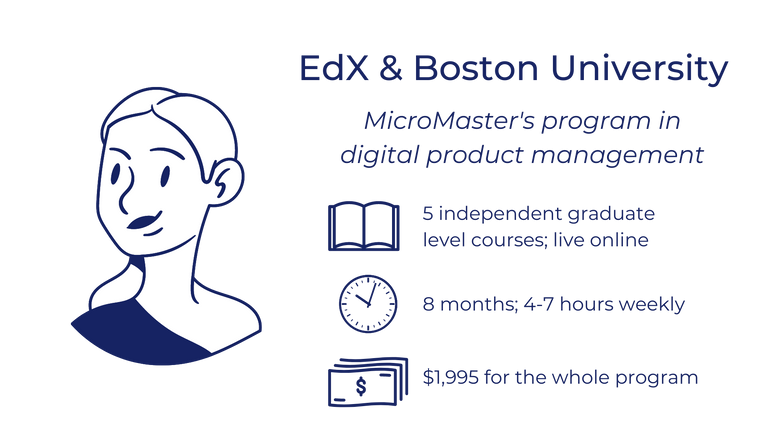
How does it work?
According to the program website, you’ll gain hands-on experience in:
- Creating product roadmaps
- Taking products from initial concept through user research, co-creation, rapid prototyping
- Agile and lean management practices for creating software and digital products
- Social media and market testing methods
- Applying perspective from best practices in platform based strategies
The program consists of five graduate-level courses, each offered independently:
- Product Management with Lean, Agile and System Design Thinking
- Platform Strategy for Business
- Strategic Social Media Marketing
- Driving Digital Innovation through Experimentation
- Business Analytics for Data-Driven Design Making
The entire program will run 8 months (about 6 weeks per class), with an expected commitment of about 4-7 hours per week. While every class is hosted online, they all run on an instructor-paced schedule, so you’ll need to check the EdX website to find out when to enroll.
Each course suggests that students have completed a few basic prerequisites, like high school algebra or beginner’s software concepts. However, lacking the recommended background won’t prevent you from enrolling.
If you pass the entire program (with a minimum of 67%) as a verified student, you can apply to Boston University’s Questrom School of Business for a Master’s Degree in Digital Innovation without taking the GMAT or GRE. If you’re accepted, your course certification can also be credited for 8 out of the 32 required academic units. However, successfully completing the online certification doesn’t guarantee you admission into the BU MSDi program.
How much does it cost?
The verified student experience, which includes lifetime access to the course, graded assignments and projects, and a shareable certificate for LinkedIn and your portfolio, costs $399 per class, or $1,995 for the entire program. However, if you only want access to course materials and discussion forums, you can audit the class for free.
Product Strategy by Northwestern’s Kellogg School of Management
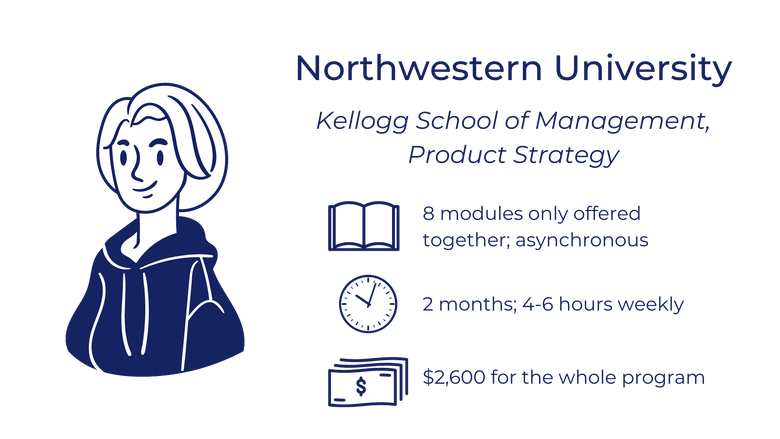
How does it work?
The Kellogg Product Strategy program focuses on foundational principles of product management, as well as real-world lessons and case studies. The program website advertises these key benefits:
- Develop a strategic mindset that anchors product strategy as the pathway to growth
- Manage partner ecosystems and learn how to create win-win partnerships
- Analyze new product opportunities to arrive at ‘go’ or ‘no-go’ conclusions
- Develop a go-to-market strategy using the 7-Elements Framework
- Create buyer personas, positioning, and messaging based on proprietary tools from the Kellogg School of Management
- Learn from real-world case studies and examples based on the faculty’s own consulting experience with tech firms like Microsoft, AT&T, Salesforce, and Facebook
The course runs for two months online, with an expected commitment of 4-6 hours per week. It’s offered as a comprehensive program, consisting of eight modules:
- Understanding Product Strategy
- Analyzing Product Opportunities
- Discovery and Requirements Definition
- Designing the Business Model
- Agile Product Development
- Taking Products to Market
- Managing the Partner Ecosystem
- Managing Product Evolution and Growth
Although most of the course content consists of videos, assignments, and discussions, there’s also 2-3 live sessions per program, although attendance isn’t mandatory. You can find the dates when each program runs on the Kellogg website.
Participants who pass with at least 80% will be given a certificate. Unfortunately, you won’t be able to count the course toward a degree, but as the 3rd best business school in the US, a Kellogg certification could still provide some added credibility to your portfolio.
How much does it cost?
The entire course costs $2,600, but you can get $260 off if you refer another student. You can also preview the program for free before you decide to enroll.
280Group’s Certified Product Manager Course
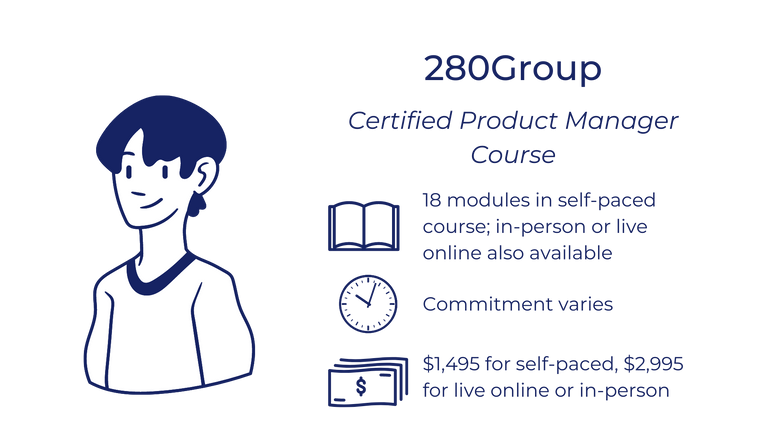
How does it work?
This course is designed for a variety of skill levels, from students who want to learn about the profession and its core skill sets to experienced product owners who want to refresh and expand their knowledge. It focuses on the Optimal Product Process, a flexible seven-phase framework that covers the product life cycle, as well as core product marketing and management skills. It also equips you with the knowledge you need to pass the AIPMM exam and gain the Certified Product Manager credentials.
The program is designed to teach you core skills and methodologies of product management, as well as prepare you for The Association of International Product Marketing and Management (AIPMM) certification exam. Since AIPMM is the world’s largest association of product managers, it’s one of the most well-recognized certifications out there. The online course consists of 18 learning modules, quizzes, interactive exercises, study materials and a practice exam.
You can buy access to the materials to learn at your own pace, or you can opt for the live online or in-person (not currently available) versions for extra attention and a more customized experience. Once you’ve completed the course, you have up to one year to take the AIPMM exam.
How much does it cost?
The basic learn-at-your-own-pace online course costs $1,495, while the live online and in-person courses are each $2,995. Every price includes the fee to take the exam for the AIPMM CPM certification.
Product School’s Product Management Certification Programs
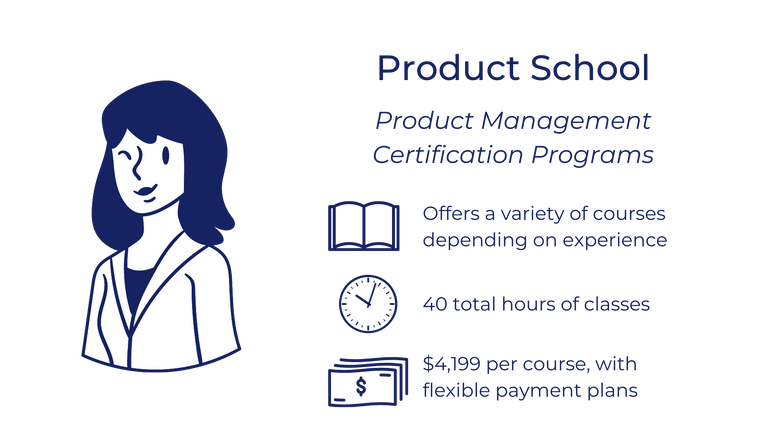
How does it work?
Product School offers three different certification courses depending on your experience level. Beginners typically get the Product Manager Certificate, which covers basics like assessing target opportunities, building software products, and how to execute a great product launch. More experienced PMs can get the Product Leader Certificate, which covers more product strategy, user research, and the UI/UX design process. Finally, higher-level professionals and senior product managers can earn the Product Executive Certificate, which explores product leadership fundamentals and how to manage growth.
All the classes are taught live online by instructors at recognized product-led companies, like Google, Spotify, and Netflix. Each class only accommodates a maximum of 20 students. Every course consists of 40 total hours of training, but participants can choose between a two-month part-time course on weeknights and weekends, or a 5-day full-time program. You can find open classes on the Product School website.
How much does it cost?
Each course starts at $4,199, but Product School offers flexible installment plans for as little as $149 per month.
Pragmatic Institute’s Product Management Certification
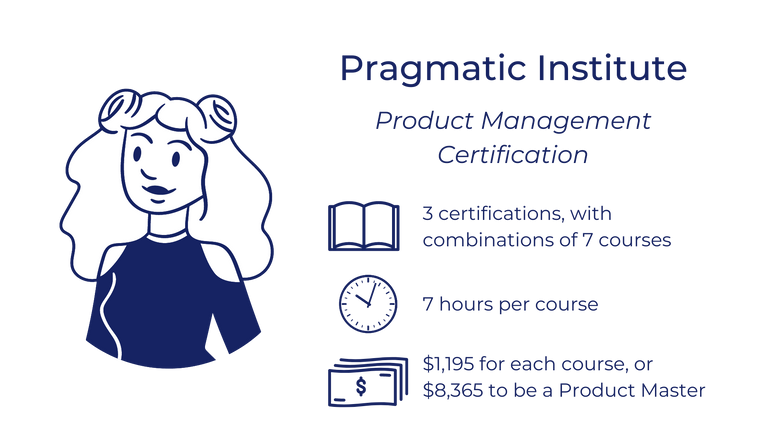
How does it work?
Pragmatic Institute also offers three different certifications. Each one is made up of a combination of the 7 Product Courses, including:
- Foundations: implement a proven, practical blueprint for being market-driven and get your entire organization on the same page
- Focus: identify and present the right product strategies to empower your company
- Build: learn how to align product and development to create remarkable products
- Market: build buyer expertise and create strategic product marketing plans that deliver results
- Launch: think strategically about launch and sales enablement to better meet business objectives
- Price: learn how to determine pricing for each product in each market
- Data science: harness the power of data in your organization and quickly identify and execute profitable data projects
Participants can choose between a virtual live course option and an on demand option (not available for all classes) for each course, both of which take place over 7 hours total. Pragmatic Institute also offers office hours every Friday at 1:30 PM ET for those who have questions or need guidance.
The Certified Product Manager sequence includes the focus, build, and foundations courses. With this program, you can gain you the tools, techniques, and the know-how to drive product success across all teams and departments.
The Certified Product Marketer sequence includes the market, launch, price, and foundations courses. This program offers you tools to drive success for your products and your company.
The Certified Product Master sequence includes all of the courses, giving you the skills you need to take charge of every aspect of your product and team.
How much does it cost?
Each course costs $1,195, which means that each certification varies in price by the number of classes it requires. While the Certified Product Manager program costs about $3,585, becoming a Certified Product Master will run you $8,365.
Is getting a product management certification really worth it?
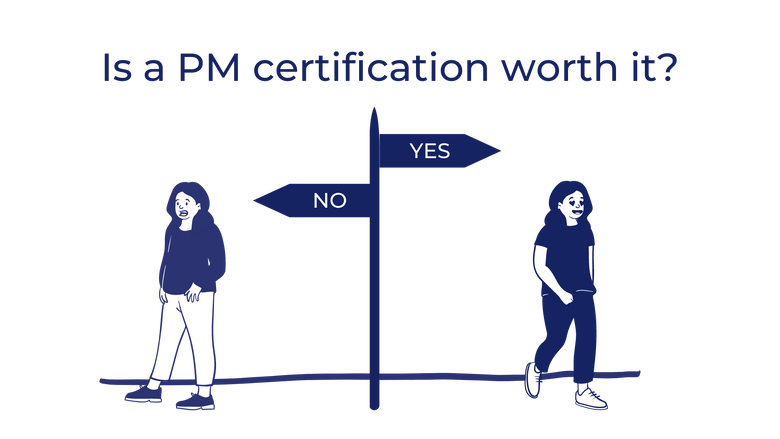
The benefits
Product management certifications-- especially those that are well-respected and up-to-date-- can pose many benefits. If you’re already a product professional, you can earn credibility among your peers and employers by showing that you understand fundamental product management skills. You can also refresh your knowledge of core concepts and use what you’ve learned to strengthen your performance as a PM.
If you’re trying to break into product and want to use a certification course as a stepping stone into the industry, it can give you a clearer understanding of the role and the skills you need to be a successful product manager. This can come in handy when discussing the position with interviewers. A product management certificate can also demonstrate a commitment to growth and a drive to build your technical skills, which shows resume screeners that you’re serious about the position.
The drawbacks
However, classes aren’t a substitute for years of experience in the industry, and few hiring managers will value a training course as much as a previous position on a product team. While it can be useful to have a grasp of the fundamentals of the job, like conducting market research or following agile development principles, knowing the information can only get you so far. Being a good product manager means being adaptable and creative, and skills that you pick up on the job are fundamentally different from the ideas that you’re taught in a classroom setting. According to an article in Hush Hush Magazine, “You can’t train into product management. PM is inherently a difficult field to get into because it’s based on ‘soft-skills.’”
Most PM recruiters seem unimpressed with even the most reputable certifications, citing that they may even hurt your candidacy. One product manager says in a Quora comment,
“Among Product Managers at top tech companies, there is no certification that carries any weight. In fact, advertising a certification on your resume is a strong negative signal, as it shows that you do not know enough about the field to know that the certifications hold no water.”
Another PM from Yelp says,
“When I see certifications listed for product manager applicants, I usually move on to the next resume.”
Assessing whether you should invest
The biases above are most likely aimed at combating the idea that a course can carry the same validity as real product experience, and they don't imply that certifications have no value whatsoever. A good program can teach you crucial skills and make you more confident in your abilities to manage a product throughout the entire process, from conception to completion. Kevin Mease, the senior VP of worldwide support at the business intelligence company MicroStrategy, thinks that product management courses can be valuable training.
“You need a framework/template to center your thinking,” he says. “You will constantly be pulled in different directions with each conversation throughout the day, so it’s important you have a framework to fall back on.”
In other words, if you think you could benefit from the content of the class, it could be worth the investment. But the certification’s credentials on their own probably won’t add much value.
👉 Learn about being a Product Manager at Capital One
Finding cheaper alternatives
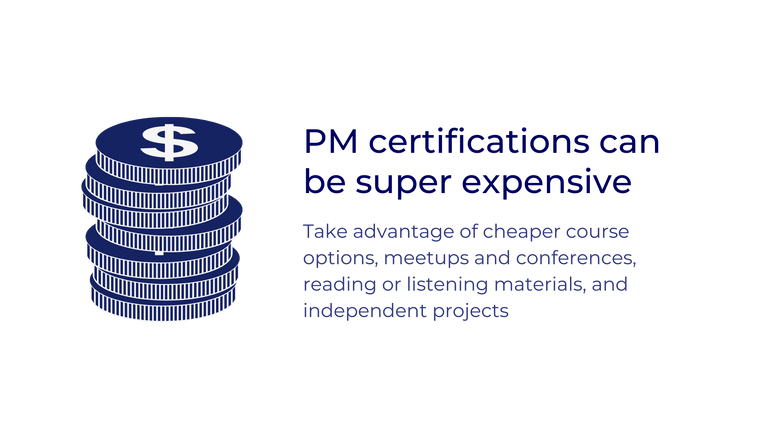
If you want some more experience and information about how to launch your product management career, but you’re on the fence about enrolling in a program, take advantage of cheaper alternatives like Udemy classes, as well as free auditing options. In addition to BU’s MicroMasters program, the e-learning program Coursera offers many free trials of PM certification classes on its platform.
There’s also plenty of other resources available to equip you with skills and advice for succeeding in product. You can look out for product meetups and conferences in your area, and seek out mentorship from PMs in your network. There’s also tons of books, blogs, and podcasts aimed at teaching about the fundamentals of product management.
As for hands-on experience, you don’t necessarily need to be working in a PM role to get the interactive product management training you’ll need to talk about during interviews. You can start your own software project, either working alone or recruiting some teammates, and focus on building out a product roadmap, considering stakeholders and target customers, and managing your product using processes that you’ve researched from PM books and frameworks. No matter how much technical knowledge you can recite back during interviews, having that real-world experience to refer back to will make you most memorable and attractive to hiring managers.
Still looking for resources? Check out Candor's Product Management course.
The information provided herein is for general informational purposes only and is not intended to provide tax, legal, or investment advice and should not be construed as an offer to sell, a solicitation of an offer to buy, or a recommendation of any security by Candor, its employees and affiliates, or any third-party. Any expressions of opinion or assumptions are for illustrative purposes only and are subject to change without notice. Past performance is not a guarantee of future results and the opinions presented herein should not be viewed as an indicator of future performance. Investing in securities involves risk. Loss of principal is possible.
Third-party data has been obtained from sources we believe to be reliable; however, its accuracy, completeness, or reliability cannot be guaranteed. Candor does not receive compensation to promote or discuss any particular Company; however, Candor, its employees and affiliates, and/or its clients may hold positions in securities of the Companies discussed.
